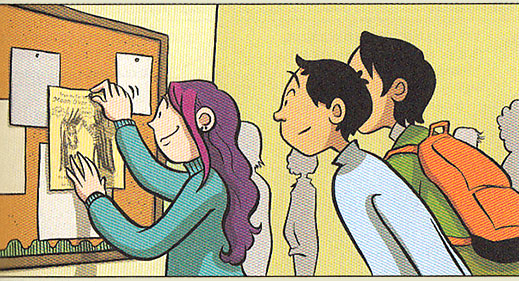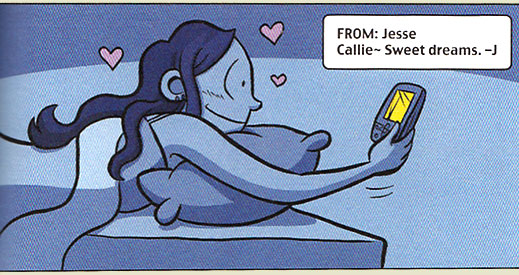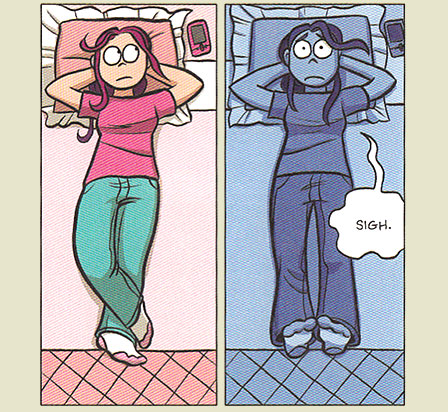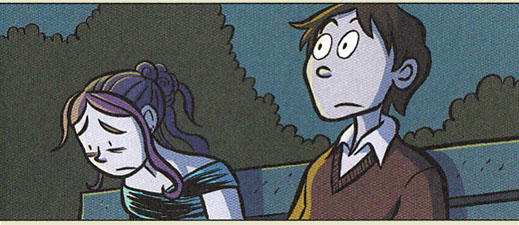Drama
 Looking back over my shoulder / I can see that look in your eye
Looking back over my shoulder / I can see that look in your eye
Turning my heart over and over / I never wanted to say goodbye
Raina Telgemeier's Drama has been reaping a handy collection of end of the year awards, both physical (I presume) and abstract (crafted of the finest internet points!). Publishers Weekly, Washington Post, New York Times. Booklist, NPR, School Library Journal. They all loved it. In the realm of young adult graphic lit, it's been a good year for Drama.
Which made me feel strange about my staunch ambivalence for the work.
I don't usually feel a little bit bad for not appreciating a book so well as nearly everyone else, but it does happen. Underwater Welder was another one. I think it has to do with both a) having deep wells of respect for the creator and b) having appreciated their previous work. Also, it helps that I imagine I like both Lemire (Underwater Welder's creator) and Telgemeier. I don't know either one but by their creations they strike me as Worthwhile People. This pile of well-regard leaves me troubled when I finish a book that peer pressure suggests I adore, but it just doesn't come together for me. I feel a bit embarrassed and a bit awkward. And a bit like one of Raina Telgemeier's characters in this book.
Too on the nose? Yeah, probably. In any case, let's not labour overly hard on how bad I feel. Instead, let's just get down to it.
 Over the laws of light / Over the moon by midnight / Let's do it all this time
Over the laws of light / Over the moon by midnight / Let's do it all this time
Part of why I'm torn on Drama is that Telgemeier has developed a tremendously likable and predictable style. When you open one of her books, you know it's her. The clean, organic lines and strong colour choices that sell her stories are completely fluid. They're actually enjoyable and give life to the experience of reading her works. A lot of good books boast great art and strong stylistic direction, but few can tout the happy exuberance of Telgemeier's work. I love her drawing and her character designs. She's a champ as a cartoonist, conveying story dynamically through expressions, posture, and action. Her static drawings are animated and I wish I could draw half so well.
Another of Drama's excellencies is Telgemeier's choice of protagonist. Callie is a good person. A girl on the brink of the terrors of high school who probably might not even encounter those social nightmares as anything of the kind. She's smart, disciplined, and energetic. And she's got a social collective that can soften the blows of even the most uncomfortable teenage mistakes. As Telgemeier writes her, Callie is an independent thoughtful heroine who is strengthened by her participation in society and in her embrace of community. Plus, at some point before the story's start, Callie boldly dyes her hair shocking pink and Telgemeier awesomely feels comfortable in never offering any explanation for the action.11That Telgemeier also had the attention to her own details to leave Callie's eyebrows their natural light brunette was not lost on me and was deeply appreciated.
 So I'm lying here / Just staring at the ceiling tiles
So I'm lying here / Just staring at the ceiling tiles
And I'm thinking about what to think about
That said, there were things that kept me from tracking with the book quite so well as I might have. One may seem legitimate but minor and the other one may seem petty and bizarre.
In the first, despite the fact that I enjoyed all of Drama's characters, I never was able to believe they were seventh and eighth graders. These kids function both interpersonally and in their school activities as if they were juniors and seniors in high school. While not without their hormonal dramas, these kids are responsible, kind, smart, and mature. They are pretty much exactly what I don't remember from junior high. They are pretty much exactly what I didn't see while working with junior high kids a few years back. They are pretty much exactly what my wife doesn't see in the junior high kids she teaches on a daily basis. They don't behave at all like the kids they are.
It's possible though that my experiences merely constituted a bad sample. It's possible that Telgemeier and her friends were pretty much exactly as self-possessed as Callie and her friends are. It's possible, but my own experiences inform my reading and so I was pulled out of the book every time we're reminded that Callie is a seventh grader.
(I suppose though that one possibility is that this book is written to the junior-high-aged reader and not to nearly forty-year-olds like me and that the book is meant to serve as a kind of pedagogical story. I suppose Telgemeier might be showing junior highers their ideal potential, what they might be if only they could emulate these characters instead of the selfish, shallow ones that other media toss their way. Or she might just be appealing to their vanity. I don't know.)22And this is the point at which I start getting notes from junior highers telling me I'm obviously too old to remember what it's like to be them and plenty of junior highers are good, mature, responsible people. This happened with my Octavian Nothing review, in which I suggested that I knew few teens who could actually appreciate the complexity of the work.
 This is the scene in which Callie tells Greg that she doesn't know how
This is the scene in which Callie tells Greg that she doesn't know how
because they totally used protection that one time, but he's a father now
Only that never happened. But it looks like it did, right?
But as I suggested, that complaint (while possibly legitimate) is pretty trivial and the reader should be able to overlook it with a slight bit of reality suspension. The real problem, for me (and possibly only for me), was that Drama holds too true to its name: there was just too much drama. And by that, I mean melodrama. Everyone is just so earnest and surprised and invested and passionate and, well, it just kind of made me uncomfortable. Telgemeier telegraphs the key to the central dilemma at the end of the book's first quarter and spends the rest of the book building toward the colossal misunderstanding against which the ship of Drama's plot must break. We know what the characters don't and so we watch them twist and struggle. I didn't enjoy that feeling, being close enough to omniscient that I could warn these characters of their folly and deflate the strength of later tragedy and embarrassment—if only I wasn't so completely transcendent that interaction was impossible.
I know some readers probably thrive on that brand of tension. I'm sure daytime television's biggest demographic would be right at home with Drama. But because that kind of story makes me uncomfortable and I get no joy from all the over-drama, Drama is not a book I enjoyed. I recognize the value of the craft that went into it and I love some of Telgemeier's other work. But in the end, Drama's obvious strengths can't overcome its apparent role, for me, as an obstacle to fun.
Good Ok Bad features reviews of comics, graphic novels, manga, et cetera using a rare and auspicious three-star rating system. Point systems are notoriously fiddly, so here it's been pared down to three simple possibilities:
3 Stars = Good
2 Stars = Ok
1 Star = Bad
I am Seth T. Hahne and these are my reviews.
Browse Reviews By
Other Features
- Best Books of the Year:
- Top 50 of 2024
- Top 50 of 2023
- Top 100 of 2020-22
- Top 75 of 2019
- Top 50 of 2018
- Top 75 of 2017
- Top 75 of 2016
- Top 75 of 2015
- Top 75 of 2014
- Top 35 of 2013
- Top 25 of 2012
- Top 10 of 2011
- Popular Sections:
- All-Time Top 500
- All the Boardgames I've Played
- All the Anime Series I've Seen
- All the Animated Films I've Seen
- Top 75 by Female Creators
- Kids Recommendations
- What I Read: A Reading Log
- Other Features:
- Bookclub Study Guides











